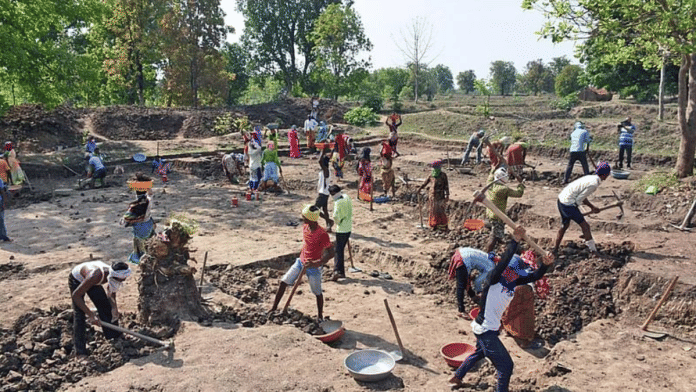New Delhi: There is a need to address the issue of disparity in wages under the Mahatma Gandhi National Rural Employment Guarantee Scheme (MGNREGS), a parliamentary standing committee has said in its report tabled in the Lok Sabha Thursday.
The panel reiterated an earlier recommendation to explore the possibility of making the wages paid under the scheme uniform across the country.
The Parliamentary Standing Committee on Rural Development and Panchayati Raj, headed by Dravida Munnetra Kazhagam (DMK) MP K. Kanimozhi, asked the Union rural development ministry to look into the issue for a “positive revision” of wages paid to workers.
Expressing concerns over the disparity in wages across the country, the panel said, “Disparity of wages and non-increase in wages commensurately with inflation is perhaps the most discouraging aspect for labourers to undertake MGNREGA works,”
The panel highlighted that daily wage rates ranged from Rs 204 to Rs 331 in different states and Union territories. According to the new wage rate notified for the financial year 2023-24, the lowest is in Chattisgarh and Madhya Pradesh at Rs 221, while the highest is in Haryana at Rs 357, the ministry website said.
The committee in its previous report, tabled in the Lok Sabha in March, had also recommended that the Department of Rural Development “increase the wage rates under MGNREGA by linking it to a suitable pricing index and explore the feasibility of notifying a uniform wage rate under MGNREGA for the entire country”.
However, according to Chakradhar Buddha, senior researcher at LibTech India — an NGO that works on rural issues — implementing uniform wage rates may not be the most effective approach considering the diverse economic conditions, cost of living, and social contexts prevailing across states.
“It is evident that wages need to be revised and reevaluated, as they currently remain insufficient and even fall below the prescribed standards set by the Minimum Wages Act. To ensure a fair representation of the realities faced by NREGA workers, it is essential to base wage decisions on the Consumer Price Index for rural workers (CPI-R) rather than CPI-Agricultural Labour (CPI-AL), which offers a more comprehensive and inclusive approach.” Buddha told ThePrint.
Also Read: Some hits and misses for India’s agricultural sector in Budget 2023
Delay in clearing dues to states
The standing committee also raised the issues of the pendency of payments to states — also raised in its previous report — and the slashing of the budget for MGNREGS for the current financial year.
The committee had observed that till 25 January, 2023, the pending liability of the central government was Rs 6,231 crore for wages and Rs 7,616 crore for material components under the scheme.
In its Thursday report, the panel said, “The committee once again urge the Department of Rural Development to not shy away from their responsibility and initiate concrete measures to reduce and finally end the existence of pendency in the release of wage/material share of the Centre through result-oriented and concerted efforts.”
In the budget for FY 2023-24, the allocation for MGNREGS has been drastically slashed to Rs 60,000 crore for this financial year from a Rs 73,000 crore budgetary estimate for 2022-23.
“The committee is not satisfied with the approach elicited by the DoRD in handling an issue of such importance which could lead to the hampering of the work being done under MGNREGA due to fund shortage. Such a scenario will not augur well for the poor rural workers under MGNREGA as want of funds could stall the projects creating pendency of wages, etc.” the panel said.
(Edited by Richa Mishra)
Also Read: Ex-finance secy writes to Modi govt, red-flags ‘gaps’ in last-mile delivery of welfare schemes






